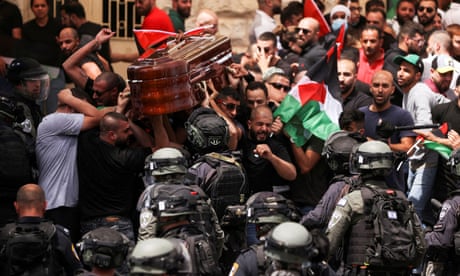- by foxnews
- 10 Mar 2025
Shireen Abu Aqleh: ‘Cold-blooded’ killing and funeral chaos leave West Bank in turmoil
Shireen Abu Aqleh: ‘Cold-blooded’ killing and funeral chaos leave West Bank in turmoil
- by theguardian
- 16 May 2022
- in news

Nahed Araf Imran and her husband Jamal were exhausted but excited on Wednesday morning: Nahed was in labour with their third child at a local hospital in Nablus, in the north of the occupied West Bank.
But when Jamal's mother arrived at the hospital crying just before the couple's daughter was born, he knew something was wrong.
"I asked her what happened and she told me that Shireen Abu Aqleh had been shot dead by the Israelis. Shireen had visited us in our town, Bureen, and covered demonstrations here many times. Everybody knows her," the 29-year-old construction worker said.
"My mum was heartbroken. I said to myself, when the baby comes, we will call her Shireen, and my wife agreed."
Shireen Abu Aqleh Jamal Imran came into the world at about noon on Wednesday. At dawn that morning, her namesake, a 51-year-old veteran Al Jazeera journalist, had been shot in the head and killed during an Israel Defence Forces (IDF) raid in the West Bank town of Jenin.
Israeli officials said they believed the dual Palestinian-American citizen had died after being hit by Palestinian fire during an altercation between IDF soldiers and Palestinian gunmen.
But the reporter's colleagues at the scene said there were no militants near the small group of journalists - all wearing helmets and body armour clearly marked as "press" - when they came under fire from the direction of the Israeli unit. Ali Samodi, an Al Jazeera producer who was shot in the back, told the Observer from his hospital bed that even after Abu Aqleh had fallen to the ground and colleagues tried to reach her, the bullets kept coming. Video of the incident confirms this version of events.
Israel has firmly rejected allegations that its soldiers deliberately targeted the journalists, but the international community is demanding answers in what Al Jazeera, the Qatar-based TV network, has described as an "assassination" carried out "in cold blood".
Unlike the killings of anonymous Palestinians that occur in the occupied West Bank on a regular basis, Abu Aqleh was a familiar face, broadcasting to millions across the Arab world and well known for her bravery during a 15-year television news career. She was also a US citizen. This time, an Israeli strategy of deflection and denial has backfired.
What is seen by the Palestinians as Israeli obfuscation also threatens to inflame a spate of violence that has surged across Israel and the Palestinian territories since late March.
A video released by the IDF of what it said were Palestinian militants engaged in a firefight in Jenin on the morning Abu Aqleh was killed has been heavily criticised: human rights group B'Tselem, which visited the two locations, found it was impossible for the shooting in the IDF-distributed video to be the same gunfire that hit Abu Aqleh and Samodi.
And the spectacle of Israeli police storming Abu Aqleh's funeral procession in Jerusalem on Friday, causing pallbearers to drop her coffin, has added to Palestinian and international outrage.
The public display of Palestinian flags in occupied East Jerusalem is forbidden by the Israeli authorities under any circumstances, but many mourners arrived waving Palestinian banners. The journalist's casket was also draped in the flag, followed by an orange stretcher bearing a flak jacket marked "press".
The EU said it was appalled by the "unnecessary" force used by the Israeli police, while the White House described footage of the scene as "deeply disturbing".
Israel's police said the mourners were "disrupting public order" by throwing stones at the heavy police presence, but on Saturday said an investigation into the officers' actions would be launched.
The battle of narratives sparked by Abu Aqleh's death is far from over. Palestinian officials have rejected the Israeli offer of a joint investigation, saying "criminals cannot be trusted", leading Israeli prime minister Naftali Bennett to accuse the Palestinians of denying Israel "access to the basic findings required to get to the truth".
Palestinian president Mahmoud Abbas said during a state memorial for Abu Aqleh in the Palestinian town of Ramallah on Thursday that the case will be referred to the international criminal court, of which Israel is not a member and whose jurisdiction the state disputes.
An interim Israeli army investigation "could not determine" who fired the fatal bullet, an IDF statement said on Friday, while an initial probe by the Palestinian public prosecution found that "the only origin of the shooting was the Israeli occupation forces".
In the meantime, even more so than during her career, Abu Aqleh's fame has grown. Outside the reporter's home in Beit Hanina in East Jerusalem this week, neighbours and friends gathered daily to mourn her death despite a raid on the house on Wednesday by Israeli forces: many have put up pictures of her in their windows. On the quiet street outside, local children gather waving Palestinian flags.
"Shireen was a Christian and we are a Muslim family, but that didn't matter," one neighbour said. "She has united us."
For the thousands of people who have thronged streets across the West Bank and Jerusalem this week in tribute, Abu Aqleh's life and death has become a potent symbol.
"Shireen's story is the story of the Palestinian people," said Imran, the father of newborn Shireen. "She will never be forgotten, especially for our family. Every time we call her name we will remember."
- by foxnews
- descember 09, 2016
Ancient structure used for cult 'rituals' discovered by archaeologists
A Neolithic Timber Circle was discovered by archeologists in Denmark resembling the historical landmark Stonehenge in the U.K. It is open to be viewed by the public.
read more


